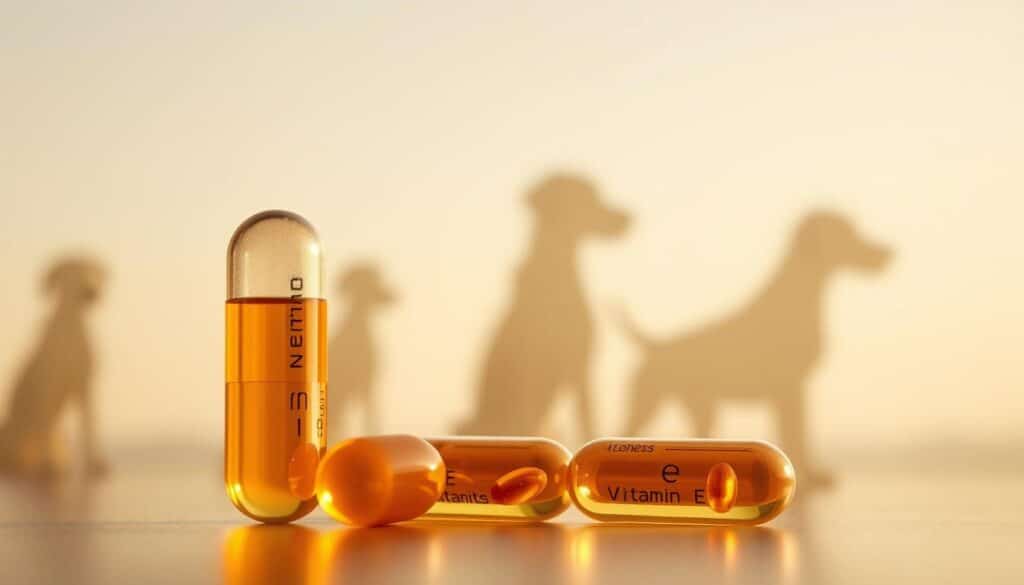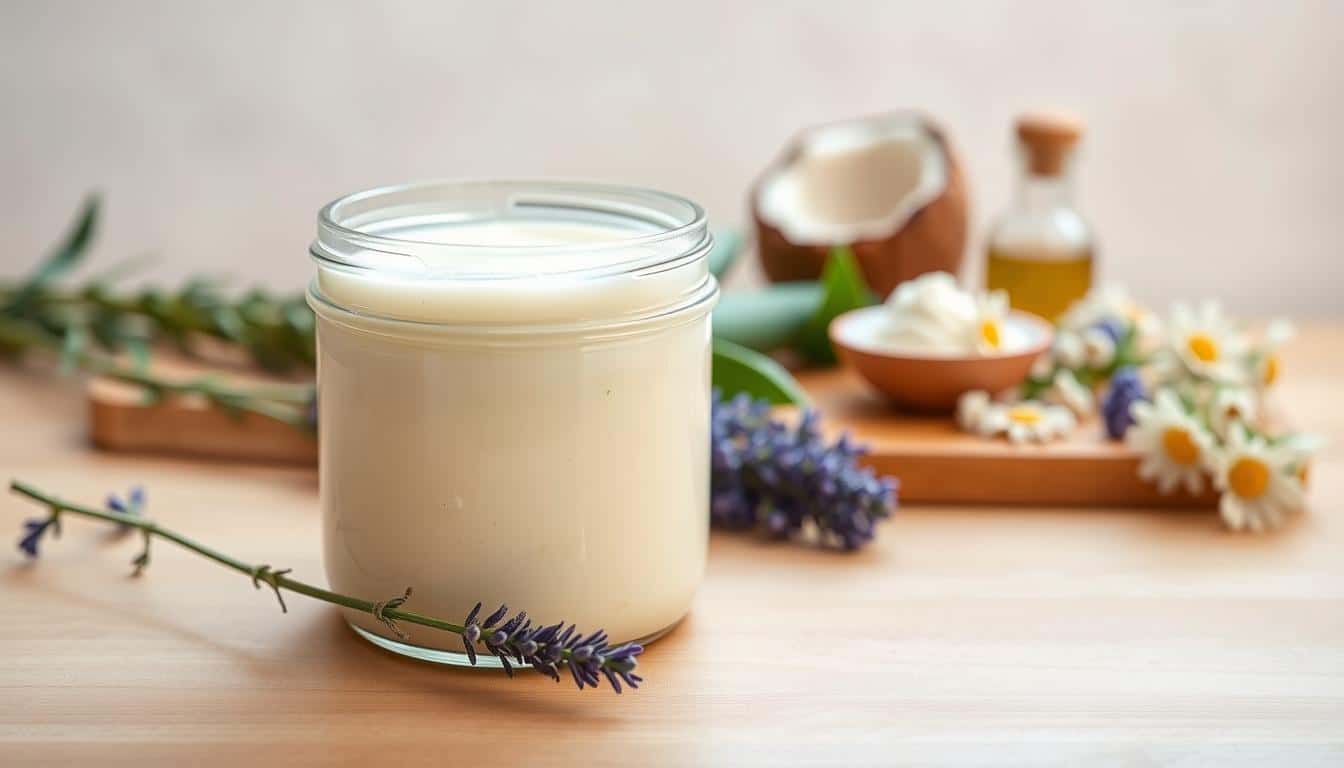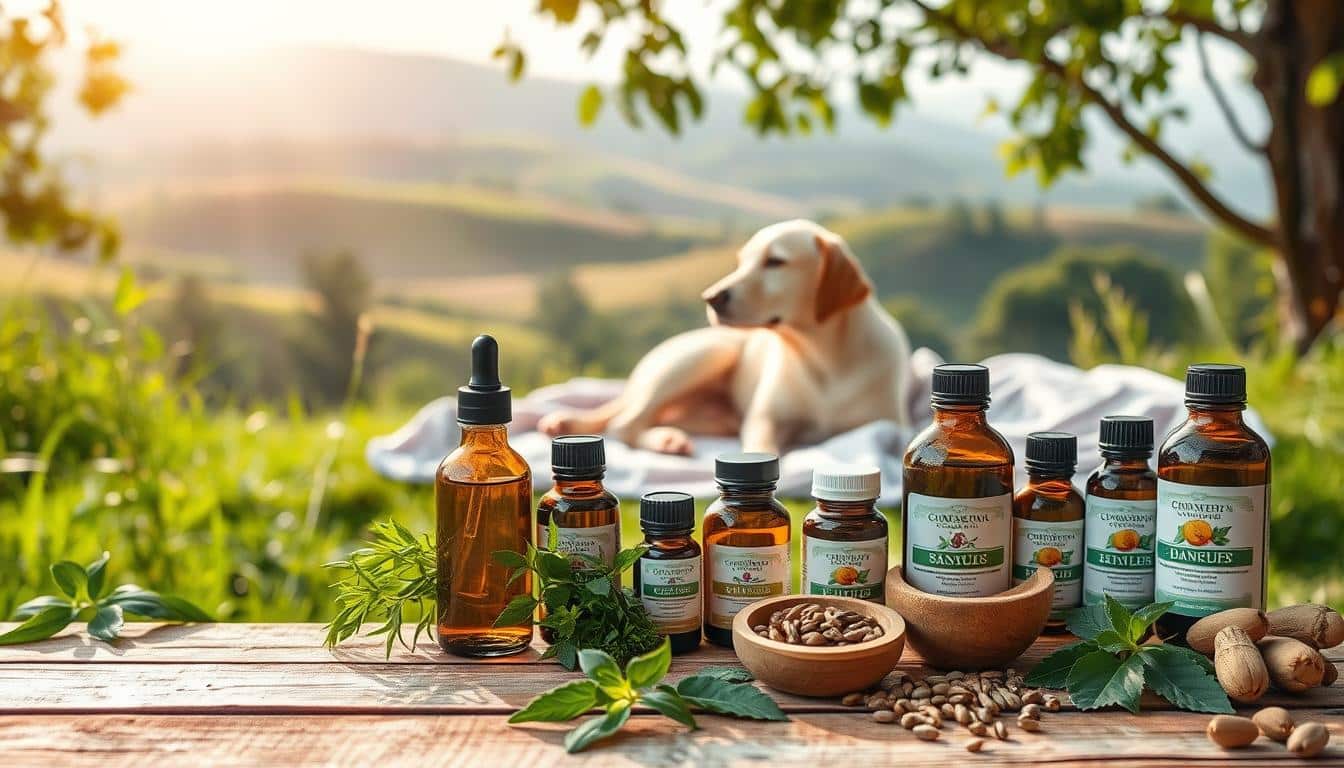Vitamin E oil is key for your dog’s coat health. It’s a fat-soluble vitamin that makes the coat shiny and easy to manage. Plus, it fights off oxidative stress as a strong antioxidant. Learning about vitamin E benefits can help boost your dog’s coat quality and lessen shedding. Next, let’s dive into the importance of vitamin E oil for keeping your dog’s coat healthy and vibrant.
Understanding Vitamin E: The Basics
Vitamin E is key for dogs, made up of tocopherols and tocotrienols. The most active type for dog health is RRR-alpha-tocopherol. As an antioxidant, it shields cell walls from damages caused by free radicals. This is crucial because such damage can trigger health problems in dogs.
Dogs often get enough vitamin E from quality commercial foods designed for them. Understanding what vitamin E is helps us see its value in a dog’s diet. Knowing the different types lets owners check their dog’s food sources for this vitamin. Diet staples like vegetable oils, nuts, and green leafy veggies are important for dogs’ meals.
What Are the Key Benefits of Vitamin E for Dogs?
Vitamin E is very important for dogs. It keeps them healthy and active. This nutrient is a strong antioxidant. It fights off damaging free radicals. It also helps protect cells which supports long life in dogs. Vitamin E also boosts their immune system. This makes them better at fighting off sickness.
Vitamin E helps keep a dog’s skin healthy too. It makes sure their skin is moist. This leads to a shiny coat and less skin irritation. Dog owners often see their pets’ coats look better with vitamin E. This vitamin also helps with joint health. It’s great for older dogs who might have arthritis or trouble moving. By adding vitamin E to their diet, you’re helping your dog live a better life.
Vitamin E Oil Benefits for Dog Coats
Understanding the benefits of vitamin E oil can make a big difference for your dog’s coat. This nutrient not only makes your furry friend’s fur look better. It also helps keep their skin healthy. Using vitamin E regularly gives your dog a shiny and vibrant coat, showing they are well taken care of.
Enhancing Coat Shine and Texture
Vitamin E oil is great for making dog coats shiny and smooth. It has antioxidants that protect hair from environmental damage. This keeps the skin’s oil production healthy, leading to a brighter coat. Vitamin E also helps maintain strong hair follicles for a luxurious, shiny fur.
Reducing Seasonal Shedding
Many dog owners try to reduce their pet’s shedding, especially when seasons change. Vitamin E oil supports skin health and keeps the fur moisturized. A moisturized coat sheds less and stays healthy all year, which cuts down on seasonal shedding. Adding vitamin E to your dog’s routine can keep their coat looking great.
The Role of RRR-alpha-tocopherol in Canine Health
RRR-alpha-tocopherol is the top form of vitamin E for dogs, vital for their well-being. It mainly works by fighting off reactive oxygen species. These harmful molecules can damage cells.
It boosts the strength of cell walls, helping them last longer. As a strong antioxidant, it aids in fighting diseases. This allows dogs to stay healthier.
RRR-alpha-tocopherol is also key in repairing tissues. It helps wounds heal quicker, whether from surgery or injury. It’s also important for dogs that are used for breeding.
Feeding your dog RRR-alpha-tocopherol will improve its health greatly. It plays an essential role in keeping dogs active and full of life.
Natural vs Synthetic Vitamin E: What’s Best for Your Pet?
Choosing between natural and synthetic vitamin E is crucial for your dog’s health. Each type has its benefits, but natural vitamin E is better overall.
Why Natural Sources Are Superior
Natural vitamin E comes from things like vegetable oils, nuts, and seeds. It’s easier for your dog’s body to use, boosting vitality. This high bioavailability is a major plus.
Synthetic vitamin E, or dl-alpha-tocopherol, is less effective. It’s because it has eight forms, but only one works well. Natural vitamin E, called RRR-alpha-tocopherol, is the top choice for health perks.
Feeding your dog natural vitamin E can make their coat shiny and reduce irritation. High-quality vitamin E sources mean a happier and healthier life for your pet.
Vitamin E’s Antioxidant Properties and Their Importance
Vitamin E is known for its strong antioxidant qualities. These are essential for keeping dogs healthy. It fights against free radicals in the body. Free radicals can damage cells and cause diseases. Adding vitamin E to a dog’s diet helps keep them healthy.
Vitamin E also protects important organs like the heart and liver in dogs. It keeps their muscles strong and boosts their immune system. With a strong immune system, dogs can easily fight off sickness.
It’s very important for dogs to get enough vitamin E. It greatly improves their life quality. This makes vitamin E a must-have in their diet.
Supporting Skin Health with Vitamin E
Keeping your dog’s skin healthy is very important. Vitamin E helps a lot with this, making sure your dog’s skin stays healthy. It’s great because it reduces irritation and keeps the skin moist.
Minimizing Irritation and Allergies
Vitamin E helps calm skin irritation and allergies in dogs. It strengthens your dog’s skin barrier, helping heal skin problems like atopic dermatitis. Adding vitamin E to your pet’s diet can make them more comfortable and healthy.
Promoting Moisture Retention
Keeping skin hydrated is key to avoiding dryness. Vitamin E does a great job at this. It helps keep your dog’s coat shiny and smooth. Properly hydrated skin means fewer skin problems and better-looking fur.
How Vitamin E Benefits the Immune System in Dogs
Vitamin E is essential for dogs’ immune health. It supports their overall well-being. This nutrient boosts the work of immune cells, like T-cells, which fight off sickness. Vitamin E makes sure these cells are working well, helping dogs stay healthy and recover quickly.
Enhancing Immune Response
Vitamin E is a powerful antioxidant. It protects immune cells from damage. This keeps the cells strong and ready to fight infections. Adding vitamin E to a dog’s diet improves their immune system. It makes them better at fighting off diseases.

Recommended Dosages of Vitamin E for Dogs
Finding the correct vitamin E dosage for your dog involves a few things. It looks at weight, age, and health. Most dogs need about 50 IU of vitamin E per kilogram of their weight every day. This amount helps keep your pet lively and in good health.
Sometimes, different dogs need different amounts of vitamin E. Dogs dealing with certain health problems might need more. It’s very important to talk to a vet to figure out the right amount for your dog.
Always watch for signs that your dog might have too little or too much vitamin E. Making changes to the dosage with a vet’s guidance helps keep your dog well and joyful.
Signs of Vitamin E Deficiency in Dogs
It’s crucial to spot nutrient shortages in our dogs to keep them healthy. Vitamin E is especially important for their body’s functions. Spotting signs of vitamin E deficiency early can really help your dog.
Look out for these health issues in your dog:
- Muscle weakness
- Rough or dull coat texture
- Skin problems such as irritation or dermatitis
- Reproductive difficulties
- Reduced immune function leading to increased susceptibility to infections
Keep an eye out for these signs. Doing so helps you care for your dog’s health and nutrition.
When to Consider Supplementing Your Dog’s Diet
Knowing when to add vitamin E to your dog’s diet is key to their health. Look for signs your dog needs vitamins like dull fur, unusual tiredness, or constant skin problems. These can mean they need more nutrients. Issues such as arthritis or a weak immune system also suggest checking their diet.
When to give supplements matters a lot, especially during certain times or health issues. Old dogs and those getting over sickness might need extra vitamins. Watch for:
- Dull or dry coat
- Frequent itching or scratching
- Low energy levels
- Visible signs of skin issues
Talking to your vet offers insights into vitamin E needs for dogs. They can create a specific supplement plan, so your dog gets just what they need.
Conclusion
Vitamin E does more than make your dog look good. It plays a big role in keeping their coat shiny and strong. Plus, it helps keep their skin healthy. By adding this vital nutrient to your dog’s food, you’re helping them live a happier life.
Adding vitamin E to your dog’s routine can stop skin problems and keep their skin moist. It’s important to give them the right amount, whether in their food or as a special oil. This small step is key for their health.
By focusing on your dog’s skin and coat health with vitamin E, your pet will be healthier and look better. Spend some time checking out how this important nutrient can help. It’s a smart move for your dog’s care plan.
FAQ
What role does Vitamin E play in maintaining a dog’s coat health?
How does Vitamin E oil improve the sheen of my dog’s coat?
Can Vitamin E help with seasonal shedding in dogs?
Why is RRR-alpha-tocopherol recommended for dogs?
What are the benefits of natural Vitamin E compared to synthetic?
How does Vitamin E oil contribute to skin health in dogs?
How does Vitamin E improve the immune system of dogs?
What is the recommended dosage of Vitamin E for dogs?
What are the signs of a Vitamin E deficiency in dogs?
When should I consider supplementing my dog’s diet with Vitamin E?
Content created with the help of Artificial Intelligence.



